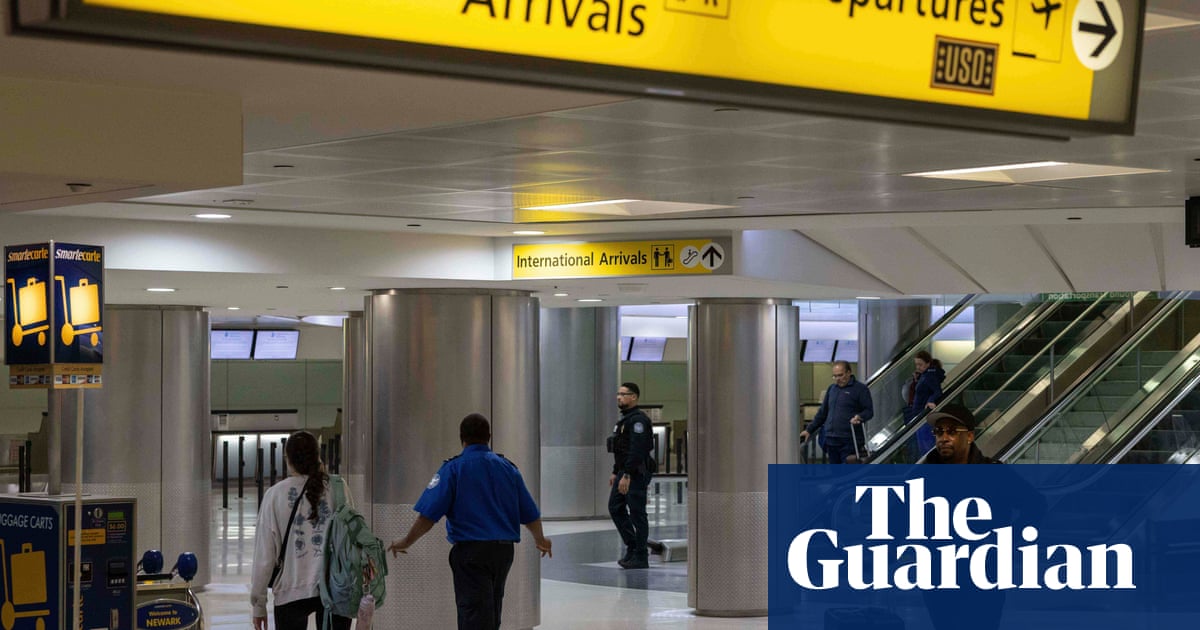As the sun rose over Caracas, Yasmin Quintero, a grandmother, was already in line at the city’s airport, trying to board the next available flight to Bogotá, Colombia.
She had originally planned to travel from Medellín to Florida on 12 June to visit her son, a US citizen, and help care for her granddaughter.
But once her family learned about the Trump administration’s travel ban on citizens from 12 countries – including Venezuela – they moved her trip forward, forfeiting the original tickets.
“The prices more than doubled in less than two hours,” she said. Now, Quintero was facing three connecting flights to reach her family – and she had lost hundreds of dollars in the process.
The new ban went into effect at 12am ET on Monday, more than eight years after Donald Trump’s first travel ban sparked chaos, confusion andmonths of legal battles.
The proclamation, which Trump signed on 4 June, “fully” restricts the nationals of Afghanistan, Myanmar, Chad, Republic of the Congo, Equatorial Guinea, Eritrea, Haiti, Iran, Libya, Somalia, Sudan and Yemen from entering the US. But restrictions were also imposed on nationals of Burundi, Cuba, Laos, Sierra Leone, Togo, Turkmenistan andVenezuela.
The US state department later clarified thattravelers with visas issued before 8 June would “generally be permitted to traveland will be inspected by CBP in alignment with current law and regulation, if no other boarding concerns are identified”.
But by then, the vaguely worded presidential proclamation had already sparked panic: in Caracas, all flights to countries connecting to the US sold out as Venezuelans with valid visas rushed to reach the US before the ban came into effect.
On Friday morning, Sonia Méndez de Zapata anxiously urged her son Ignacio to proceed straight to security after check-in. Ignacio, who is studying engineering in North Carolina, had returned home in late May to spend the summer with his family. But student visas are also affected by the new restrictions, and as soon as the news broke he cut short his visit after just 10 days back home.
The family arrived at Simón Bolívar international airport at least four hours ahead of his flight to Curaçao, the first leg of a hastily rearranged itinerary. “He would lose his life if he stays here,” Méndez de Zapata said, expressing concern about the lack of opportunities for young people in Venezuela.
For others, the announcement shattered long-held routines. Sara Fishmann, a consultant who has travelled to the US regularly for over three decades, said it was the first time she felt anxious about entering the country. The US, she said, had become a natural gathering place for her dispersed family.
“Now I’m scared it will no longer be a place where we can reunite,” she said. “I don’t even know who we’re the victims of any more. It feels like all of them – the politicians.”
Members of the Venezuelan diaspora – now nearly 8 million strong – have also felt the impact of the decision. Among them is Iván Lira, who lost his job at a US-funded NGO in March after the suspension of USAID operations in Venezuela. Lira, who now lives in Bogotá, was supposed to be the best man at his cousin’s wedding in the US on 20 June.
“Not being able to attend would be demoralizing,” Lira said. “We’re practically brothers. Not being there on such an important day – one that will be remembered forever – would be painful.”
He described the prevailing mood among Venezuelans as one of desperation. “It’s a decision that stigmatizes Venezuelan people,” Lira added.
The US justified Venezuela’s inclusion in the ban on the grounds that the government of Nicolás Maduro has long refused to accept deported nationals.
Opposition politicians – who have looked to Washington to support their efforts against Maduro – remained silent on the travel ban until 6 June, when the opposition figurehead María Corina Machado’s party, Vente Venezuela, published a statement via X urging the US government to revise the travel restrictions, arguing that Venezuelans are victims of a “criminal regime” and forced into mass displacement. Machado reposted it on X but did not comment further.
Machado – who enjoys broad support among US officials and politicians – has long been seen as a leading figure in the fight for democracy in Venezuela.
Francis García, who has lived in Argentina for over seven years, knows the weight of the Venezuelan passport all too well. She frequently travels to the US to see her long-distance partner. But during her most recent trip, she was subjected to aggressive questioning at the border.
“Being Venezuelan, nothing is ever simple,” García said. “You leave the country, but it doesn’t matter. I left hoping things would get easier – but they never do.”
Meanwhile, as travelers scrambled to leave, Simón Bolívar international airport swelled with police officers accompanying passengers on the latest flight under the government’s Return to the Homeland Plan – a voluntary repatriation scheme framed as self-deportation.
